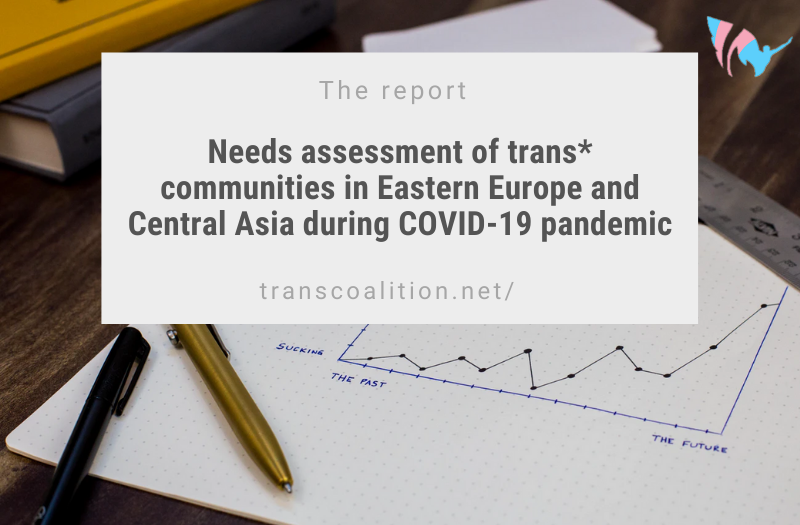Trans* Coalition conducted a survey about the needs of trans and non-binary people of Eastern Europe and Central Asia (EECA) region from March 25th through April 5th, 2020. At the closing of the survey it was completed by 325 trans and non-binary people aged 14 to 60.
Average age of the survey participants is 27 years.
Gender identity
- Trans men – 126 (39%)
- Trans women – 122 (37%)
- Non-binary and/or queer persons – 64 (20%)
- other – 13 (4%)
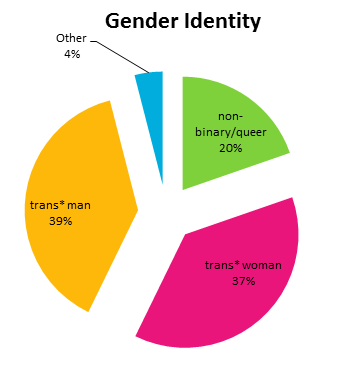
Country representation
Survey participants are based in 10 countries of EECA region, in the EU and other countries. Majority of participants reside permanently or temporarily in Russia, Ukraine, Kazakhstan, Belarus and Kyrgyzstan.
- Russia – 138 (42%)
- Ukraine – 88 (27%)
- Kazakhstan – 41 (13%)
- Belarus – 22 (7%)
- Kyrgyzstan – 18 (6%)
- Moldova – 4 (1,2%)
- Tajikistan – 2 (0,6%)
- Georgia – 1 (0,3%)
- Armenia – 1 (0,3%)
- Azerbaijan – 1 (0,3%)
- EU countries – 7 (2,2%)
- Other countries – 2 (0,6%)
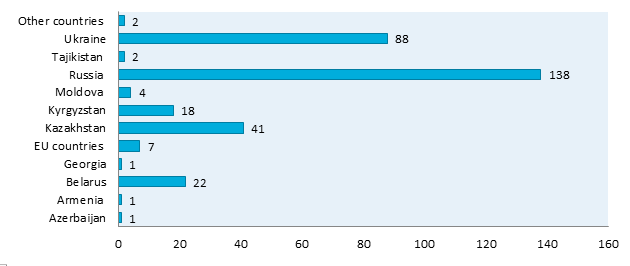
Intersectionality
Only one-third of the survey participants are not representing cross-groups (i.e. groups that may add additional layers of vulnerability). The rest of the survey participant belong to a cross-group. One-third of all the participants consider themselves poor. Many of them have health issues including compromised immune system, disabilities, chronic conditions, HIV, post-surgical health issues. Around 6% of the survey participants are sex workers and around the same number are migrants, around 5% use drugs.
- Poor – 117 (28,5%)
- Compromised immune system – 32 (7,8%)
- Persons with disabilities – 25 (6,1%)
- Migrants – 26 (6,3%)
- Drug users – 20 (4,9%)
- Sex workers – 25 (6,1%)
- Mental health conditions – 11 (2,7%)
- Chronic conditions – 11 (2,7%)
- People living with HIV – 5 (1,2%)
- Post-surgical health issues – 2 (0,5%)
- Do not belong to any cross- group – 131 (32%)
- Other – 5 (1,2%)
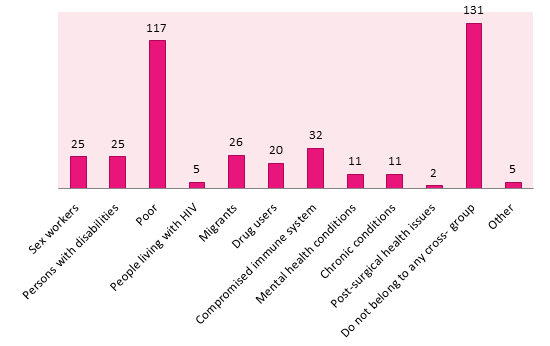
Challenges that trans and non-binary people encounter during the pandemic of COVID-19
When asked to choose three major challenges, survey participants noted decrease in their income and unemployment. 13% reported worsening of their psychological wellbeing. Around the same nymber of people reported challenges connected to healthcare, need for doctors, medical information and fear of hospitals.
Moreover, trans and non-binary people reported lack of access to prescriptions for hormones, increasing prices for hormones and difficulties in purchasing hormones due to financial issues. A numbe of people have difficulties with paying their loans, debts and rent for housing.
Almost 4% of the participants (52 out of 325) reported living in an abusive situation including psychological and physical violence.
- Income decrease – 189 (14,1%)
- No work – 173 (12,9%)
- Worsening of psychological wellbeing – 172 (12,8%)
- Fear of the hospitals/other – 167 (12,5%)
- Lack of access to healthcare – 106 (7,9%)
- No counselling – 93 (6,9%)
- Difficulties with paying debts – 86 (6,4%)
- Fear of hospitals (mismatch in documents) – 79 (5,9%)
- No information about COVID specific for trans people – 75 (5,6%)
- No prescriptions for hormones – 67 (5%)
- Live in an abusive situation (psychological or physical violence) – 52 (3,9%)
- No safe space – 51 (3,8%)
- Issues with hormones – 12 (0,9%)
- Other– 18 (1,3%)
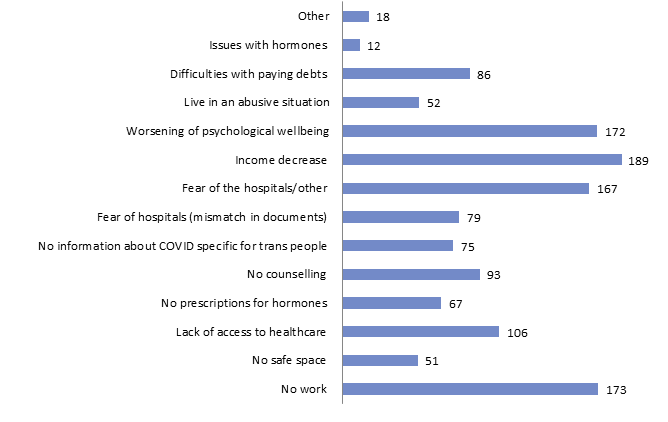
Needs
When asked “What kind of support do you need right away?”, the survey participants responded the following: one-third needs to earn money; around 13% need psychological counselling and the same number is in need for food. 11% reported that they need prescriptions for hormones, 9% need medical help and around 7% reported needing an online consult by a doctor. There is also a need for trans-specific information about COVID-19 and peer-to-peer counseling. Almost 4% of the survey participants need shelter or other kind of safe housing.
- Opportunity to make money – 229 (29,4%)
- Psychological counseling – 103 (13,2%)
- Food – 99 (12,7%)
- Prescription for hormones – 85 (10,9%)
- Medical care – 69 (8,9%)
- Online consult by a doctor – 52 (6,7%)
- Information about COVID-19 – 39 (5%)
- Peer-to-peer counseling – 35 (4,5%)
- Shelter/housing – 29 (3,7%)
- Other – 39 (5,01%)
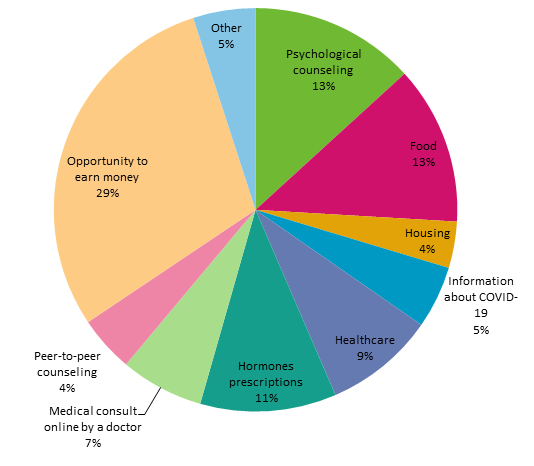
Summary
The main trends in worsening of trans and non-binary persons’ situations in connection to COVID-19 are as follows:
- Sharp decrease in income which makes it impossible for pay rent, afford hormonal therapy, groceries, medications and other essential items;
- Meaningful decline in psychological wellbeing related to stress, fear for own health and future, psychological violence, threats of physical violence, uncertainty, bodily issues, issues with starting or continuing transitionining;
- Medical issues: issues with receiving prescriptions for hormonal therapy, medication for mental health issues, other medications; lack of funds for medications and doctors; lack of access to doctors and significant fear of ending up in the hospital and receiving quality care in case of contracting COVID-19; lack of reliable information about COVID-19 and its risks for trans and non-binary people;
- Bullying, misgendering, pressure from relatives and other people who cohabit with survey participant during the quarantine; lack of alternative housing or impossibility to move between countries or regions;
- Lack of access to doctors, psychologists, partners and other trans and non-binary people; lack of affirming communication;
- Trans and non-binary people with intersecting vulnerabilities are in a particularly dire situation. Trans and non-binary people who are poor, sex workers, migrants, live with chronic health conditions and HIV report acute psychological distress.
Please click on link below to download the report

